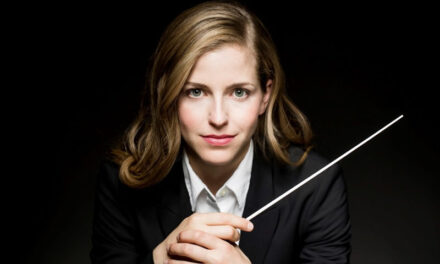Since Daniel Meyer has announced he will leave his post as music director of the Asheville Symphony Orchestra after the 2017-18 season, every guest conductor will now be subject to scrutiny. Is he or she a candidate to succeed Meyer? Could this person continue to advance the orchestra, as Meyer has done over the last ten years and more? After hearing Courtney Lewis direct the orchestra Saturday in three Classical and Romantic German works, my hope is that this conductor, now in year two as music director of the Jacksonville Symphony Orchestra, is on the short list.
The concert opened with Johannes Brahms’ Variations on a Theme by Joseph Haydn, Opus 56a. The theme actually antedates Haydn, and while its source as the St. Anthony Chorale is obscure, it is from the Baroque era. From the get-go, Maestro Lewis showed a thoughtful interpretation. In the statement of the theme, he used terraced dynamics; the volume stayed the same for a period of time and suddenly shifted to a different dynamic level, with no gradual crescendo or decrescendo. This is exactly as was used in the Baroque era, and allowed the conductor to set up a distinction between the Baroque theme and the Romantic variations that followed.
Brahms’ orchestration is skilful, with his usual hemiolas and attention to inner voices. The ASO paid meticulous attention in response to Lewis’ rehearsal and in-concert cues. I found his treatment of “silence” to be intriguing; the space between variations varied according to the nature of the variation just concluded and the one upcoming. Throughout, Lewis provided a clear beat, made thoughtful use of his left hand, and shaped phrases almost to a fault. I say “almost to a fault” because while the detail verged on being fussy, it never offended. It was purposeful shaping, reminding me of the Berlin Philharmonic Orchestra under von Karajan. Yes, this conductor and von Karajan can be spoken of in the same paragraph.
Cicely Parnas joined a reduced orchestra to perform Franz Joseph Haydn’s Cello Concerto in C. This young cellist, granddaughter of noted cellist Leslie Parnas, has received excellent reviews in New York and elsewhere. While her technique is indisputably magnificent, I could not get excited about her performance of the Haydn on this occasion. It seemed to me perfunctory, showing no sense of discovery. It was as though the soloist said, “Oh yes, the Haydn. I know it,” and went into autopilot. I have no strong criticisms of anything she did; she just did not convince me that I should be stirred.
After intermission, we heard Robert Schumann’s Symphony No. 3, known as the ‘Rhenish.’ Schumann was bipolar, and in his manicky enthusiasm he made this symphony a programmatic representation of his love for the Rhineland, and in particular of a happy trip that he and wife Clara Wieck Schumann had taken there. The first movement opens with swaths of color that should envelop the audience. While the ASO did its part, the sound was distorted and swallowed up by the unsatisfactory acoustics of the Thomas Wolfe Auditorium. The second movement Scherzo begins with key passages by the low strings, which were adroitly executed. After a nostalgic third movement, the fourth movement “Feierlich” (“solemn”) represents the composer’s reaction to attending the elevation of a cardinal at the Cologne Cathedral during his happy time there. The trombones have been waiting silently (and probably with trepidation) for three movements for this – their big moment, when they burst out in stately triumph. This key movement is followed by a jolly fifth movement. Lewis fairly danced on the podium.
Lewis was born in Northern Ireland. He came from a musical background, and an early teacher suggested he listen to a lot of music. He did so, avidly reading scores while listening to records from the time he was twelve years old. He pursued education in England as a composer, and I suspect that his insight into compositional structure informs his conducting. As a conductor, he is a protégé of Mark Elder, music director of the Hallé Orchestra in Manchester, England, but his career has been largely in the United States.
In a January 2016 published interview with Michael Dervin of the Irish Times, Lewis described his ambitions for the Jacksonville Symphony Orchestra. He praised their 1990’s concert hall, in shape and size a replica of Vienna’s Grosshalle Musikverein, and spoke of “untapped funding resources.” Perhaps he could find the untapped resources here to build the hall that we badly need. But first things first. I hope he returns to Asheville as a guest conductor in a program that includes 20th century composers as well as music from the French and Russian repertoire.











